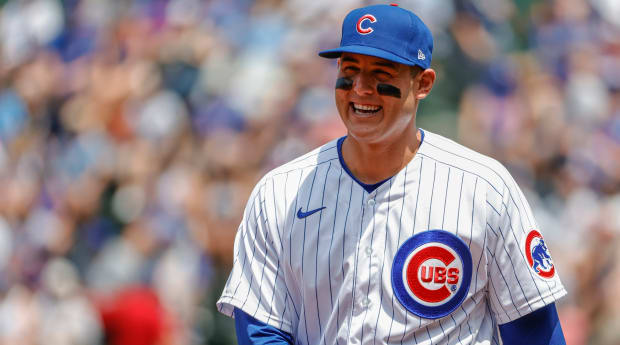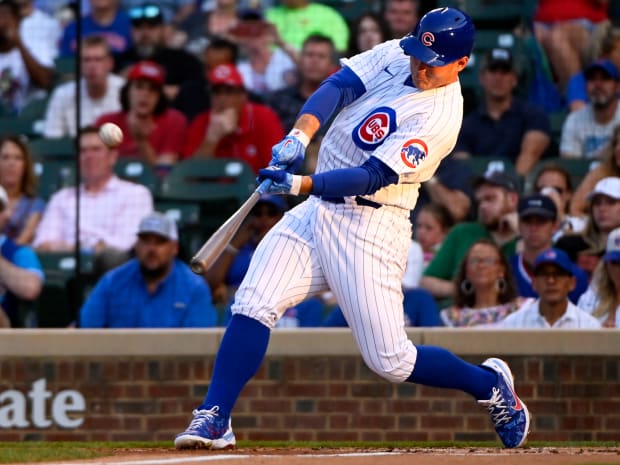New York addressed its biggest weakness in trading for Chicago’s first baseman one day after getting Joey Gallo
The Yankees have seen little go according to plan for them this season. They’ve seen the complete opposite at the trade deadline.
After picking up Joey Gallo on Wednesday, they kept up the momentum by adding another crucial lefty bat, first baseman Anthony Rizzo, in a trade with the Cubs on Thursday. For Yankees fans who have been pleading for left-handed hitting, it’s hard to imagine a better answer than this. A few games out of the last spot for a wild card, they still face a hard road to October, but their path looks much, much clearer than it did at the beginning of this week.

The Cubs will send Rizzo to New York while covering the $6 million left on his contract in exchange for two Yankees prospects: 19-year-old Kevin Alcántara, a high-upside outfielder, and 24-year-old Alexander Vizcaíno, a right-handed pitcher.
The trade hits some of the same notes as the one for Gallo. Both saw the Yankees acquire a left-handed hitter who can mash while also providing a defensive upgrade. Both saw them dodge luxury tax concerns by having their trade partner foot the cost of the remaining contract. Both saw them focus on the immediate future. (Rizzo will be a free agent after this season; Gallo, after 2022.) And both saw them pull off the deal by relying on the depth of their farm system—while well-regarded prospects changed hands in both of these trades, the franchise made two major deals while also making sure that its top minor-leaguers stayed put, evidence of just how much the club has built out its pipeline in recent years.
All of which should feel like a deadline triumph for New York and general manager Brian Cashman. In 48 hours, the Yankees have turned a weakness into a strength. Their lack of left-handed hitting before was glaring: their .633 OPS from lefties was among the lowest in baseball. Accordingly, they were one of only two teams with fewer than 1,000 plate appearances by lefthanders this season. They’ve now added two of the strongest options on the market. While Rizzo is not quite the same hitter he was from 2014 to 2016—a stretch where he made three consecutive All-Star teams with an OPS+ that never dropped below 140—he’s still a solidly above-average presence at the plate who adds some real on-base skills. He’s a defensive upgrade for the infield, too: Rizzo leads all first baseman this year in Statcast’s Outs Above Average. And with a day left until the trade deadline, the Yankees have time to listen to offers for current first baseman Luke Voit, which might improve their playoff outlook here even more.
But reaching October will still be a tall order for the Yankees. They look much better than they did a few days ago. (That’s apparently put some pressure on the two teams ahead of them in the AL East.) Yet they still sit three games behind the A’s for the second wild-card spot, and seven behind the Rays for the first one. Neither of those two teams seems inclined to roll over now. Oakland just made a key addition of its own by bringing in Starling Marte. Last week Tampa Bay added Nelson Cruz, and this week it has surfaced in several other trade rumors.

The Yankees have filled their biggest hole; their moves this week should go a long way toward bolstering an offense that had been fairly lackluster. But they still have ground to cover on two strong teams. Which is all to say that the next two months could be a lot more fun—and more tense—than was previously expected in the American League.
For the Cubs, meanwhile, this move is the end of an era. Rizzo was the longest-tenured player on their roster—his acquisition almost a decade ago signaled the start of the franchise’s rebuild that would take root over the next few years. He was a cornerstone of the 2016 World Series team. But now, in a move that has looked clear as this team trudged through its last two seasons, he’s out the door. In the next 24 hours, he should be joined by closer Craig Kimbrel and third baseman Kris Bryant, and perhaps even more. And the Cubs’ choice of return from the Yankees sends a signal of its own: They targeted prospects who have considerable potential upside but are not particularly close to the majors. Maybe that approach will vary with the deals to come; perhaps their priorities will look different as they seek to trade their other stars Friday. But it’s clear that the Cubs are turning the page here. The question is just how long it will take for the next winning chapter to start.
More MLB Coverage:
• In Joey Gallo Trade, Yankees Bet the Farm on Another Slugger
• Inside Alex Cora’s Second Chance After Scandal
• Rays Find New Sense of Urgency to Heat Up AL East Race
• Starling Marte Trade Is Win-Win Deal for Both A's and Marlins